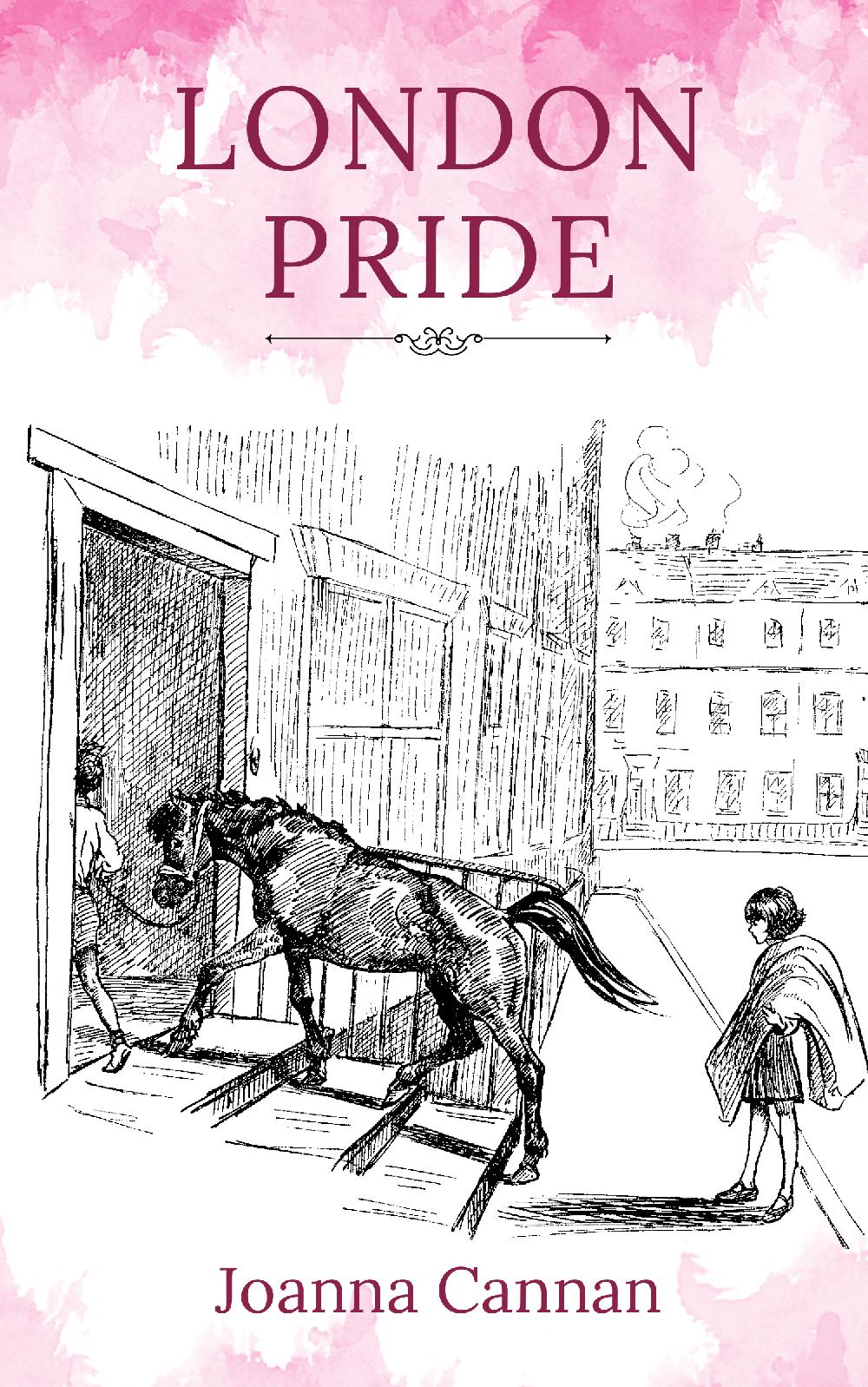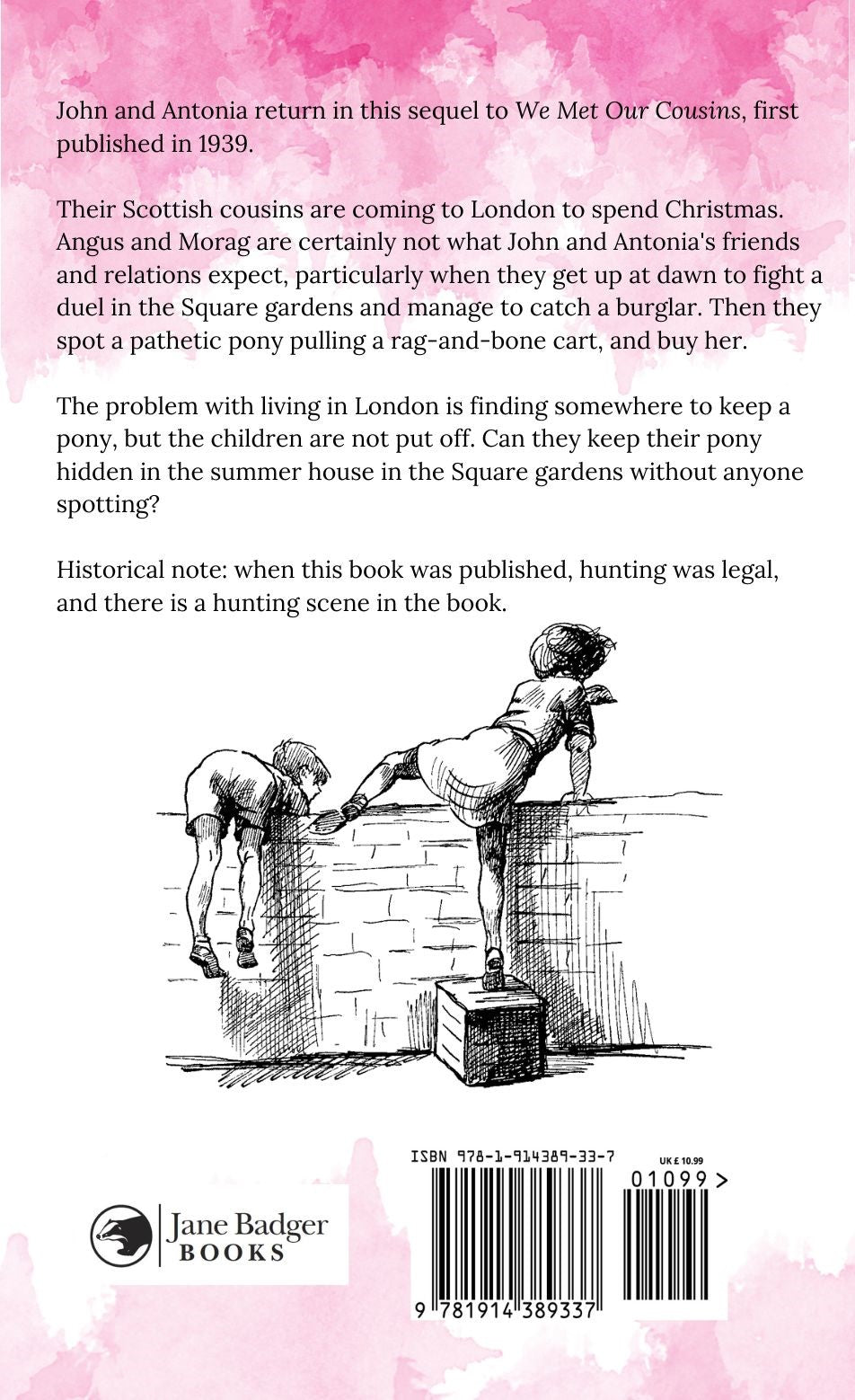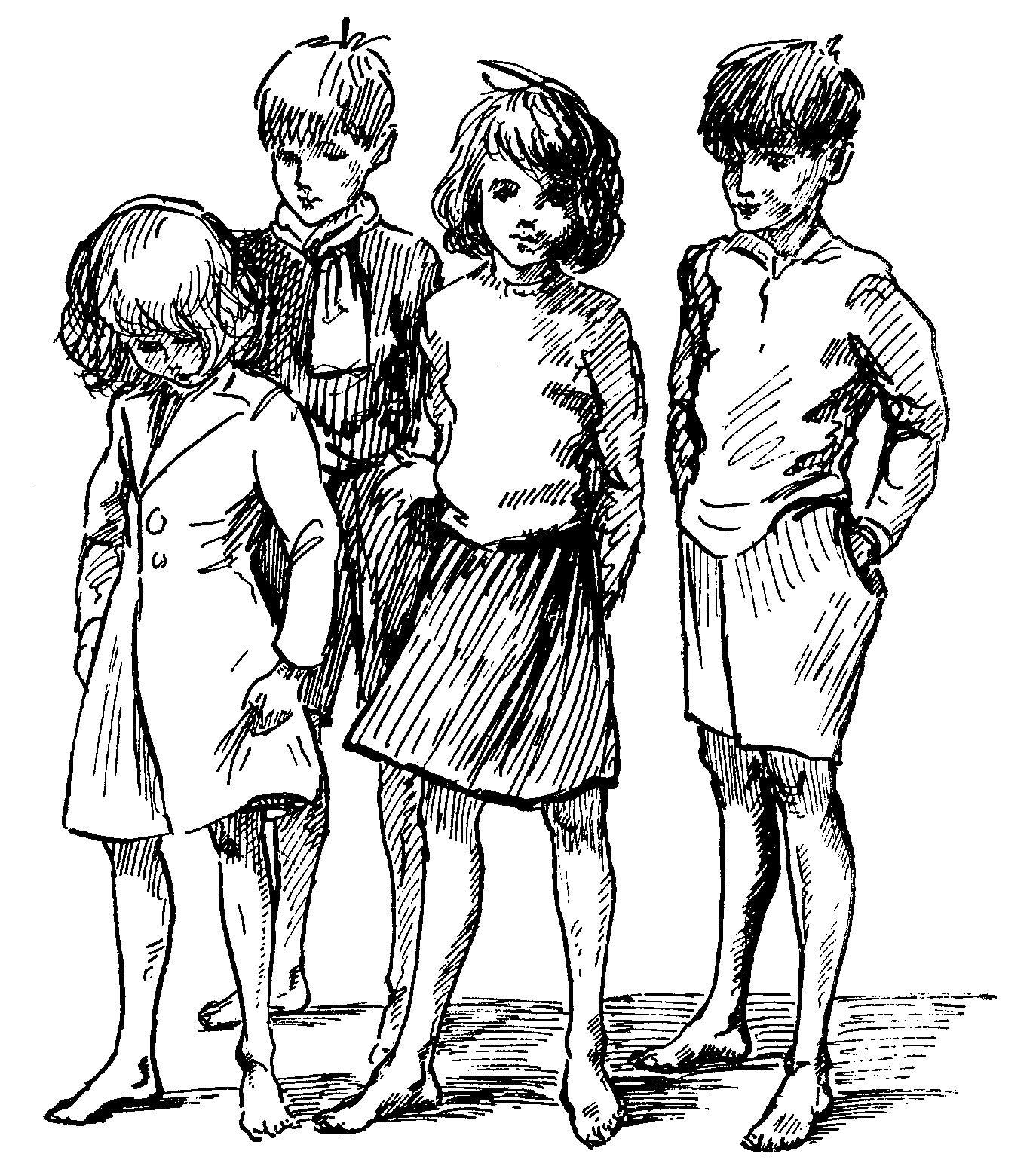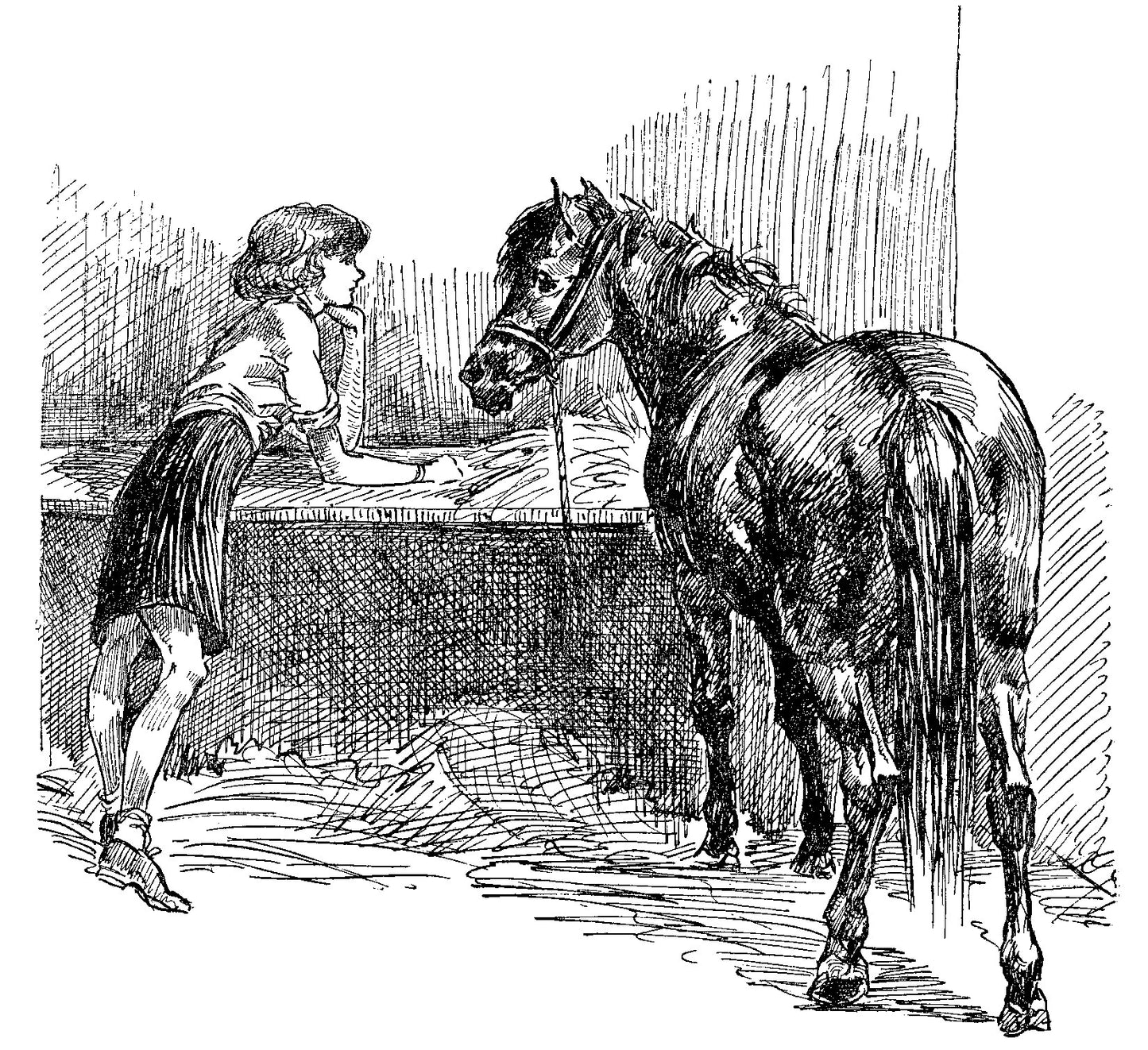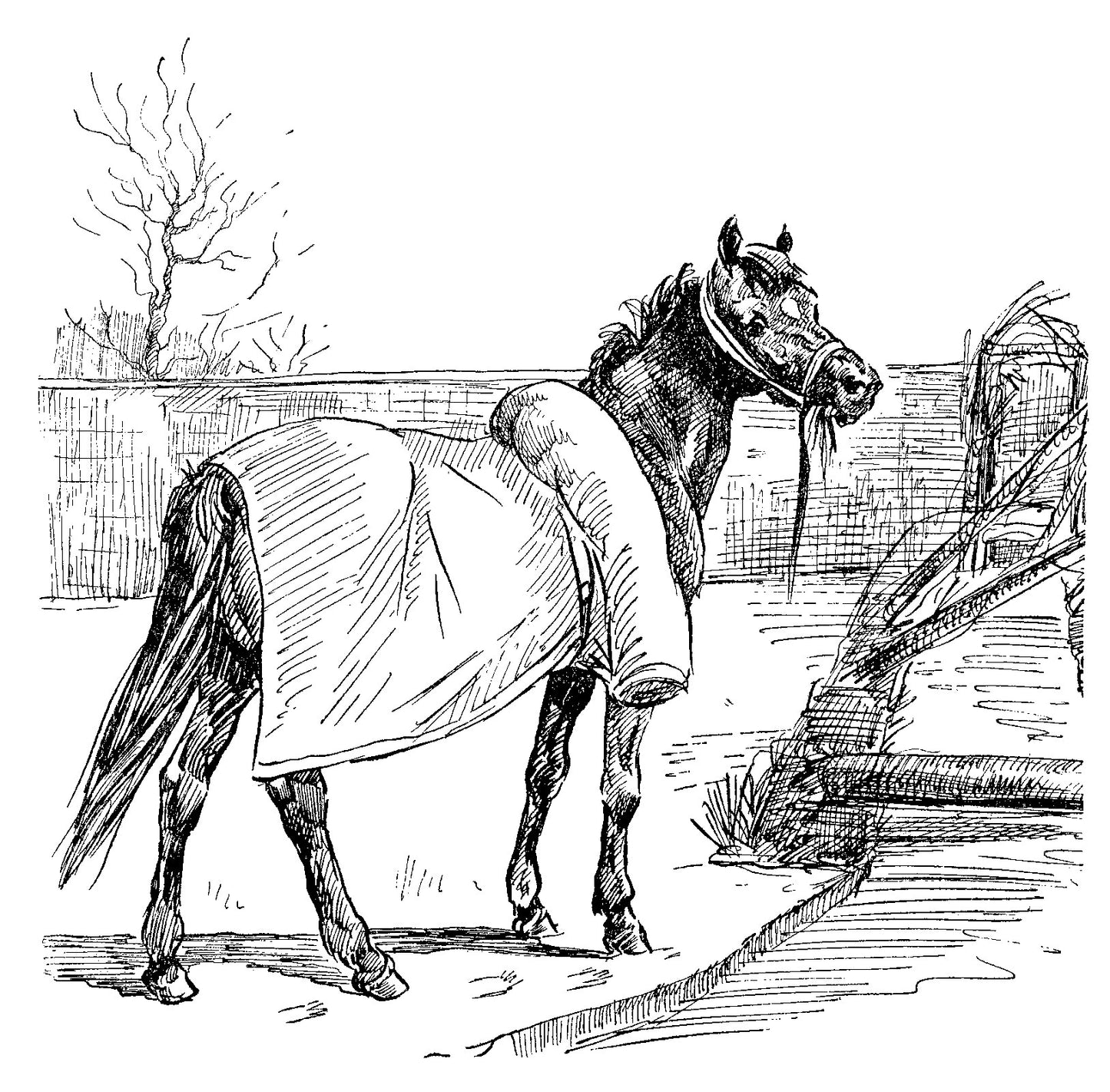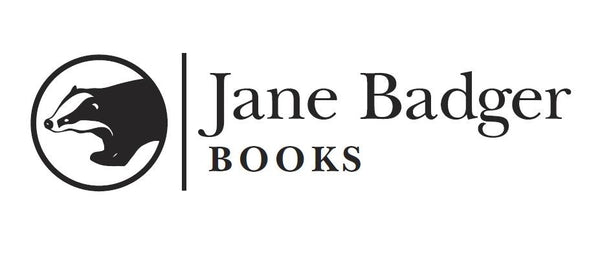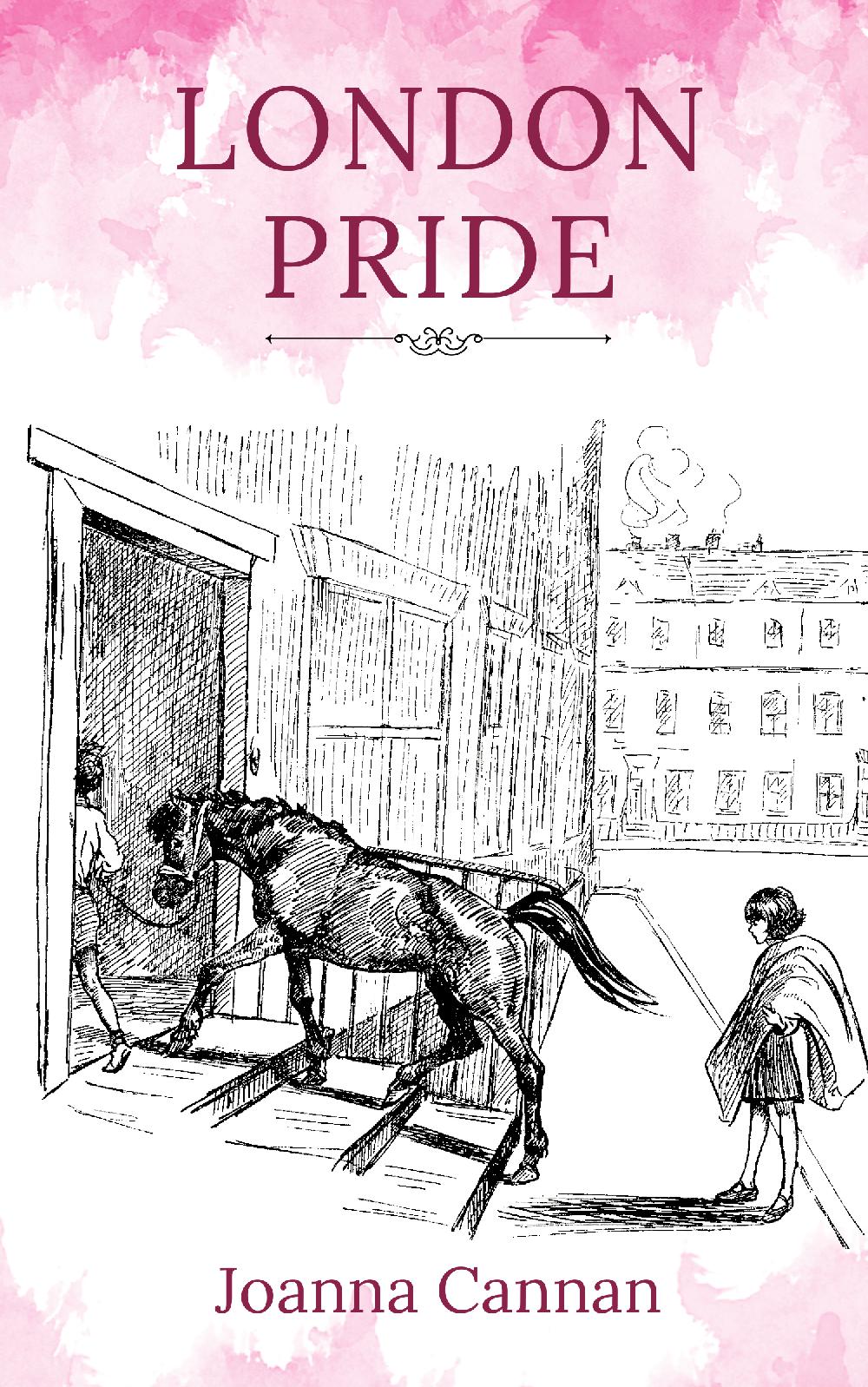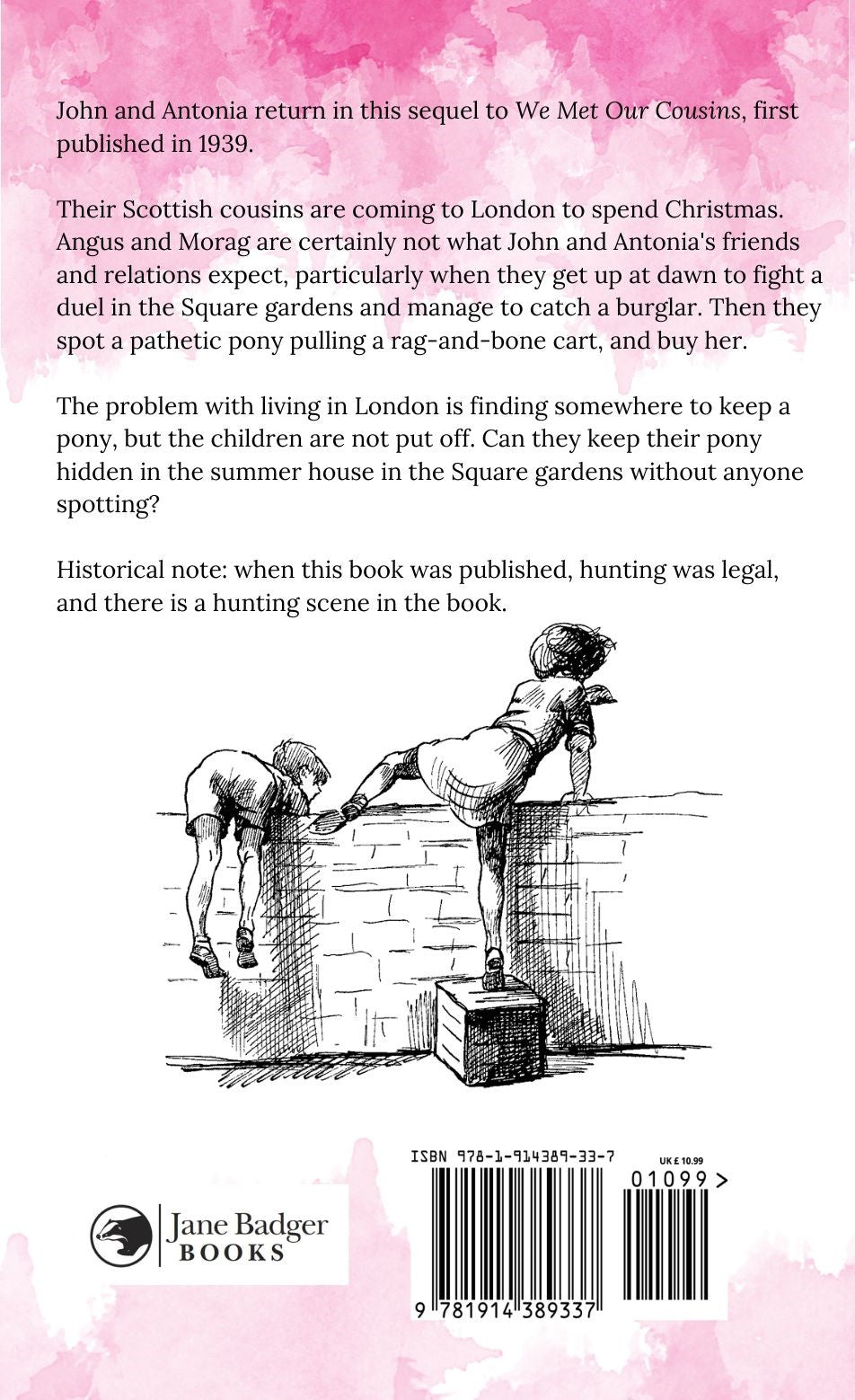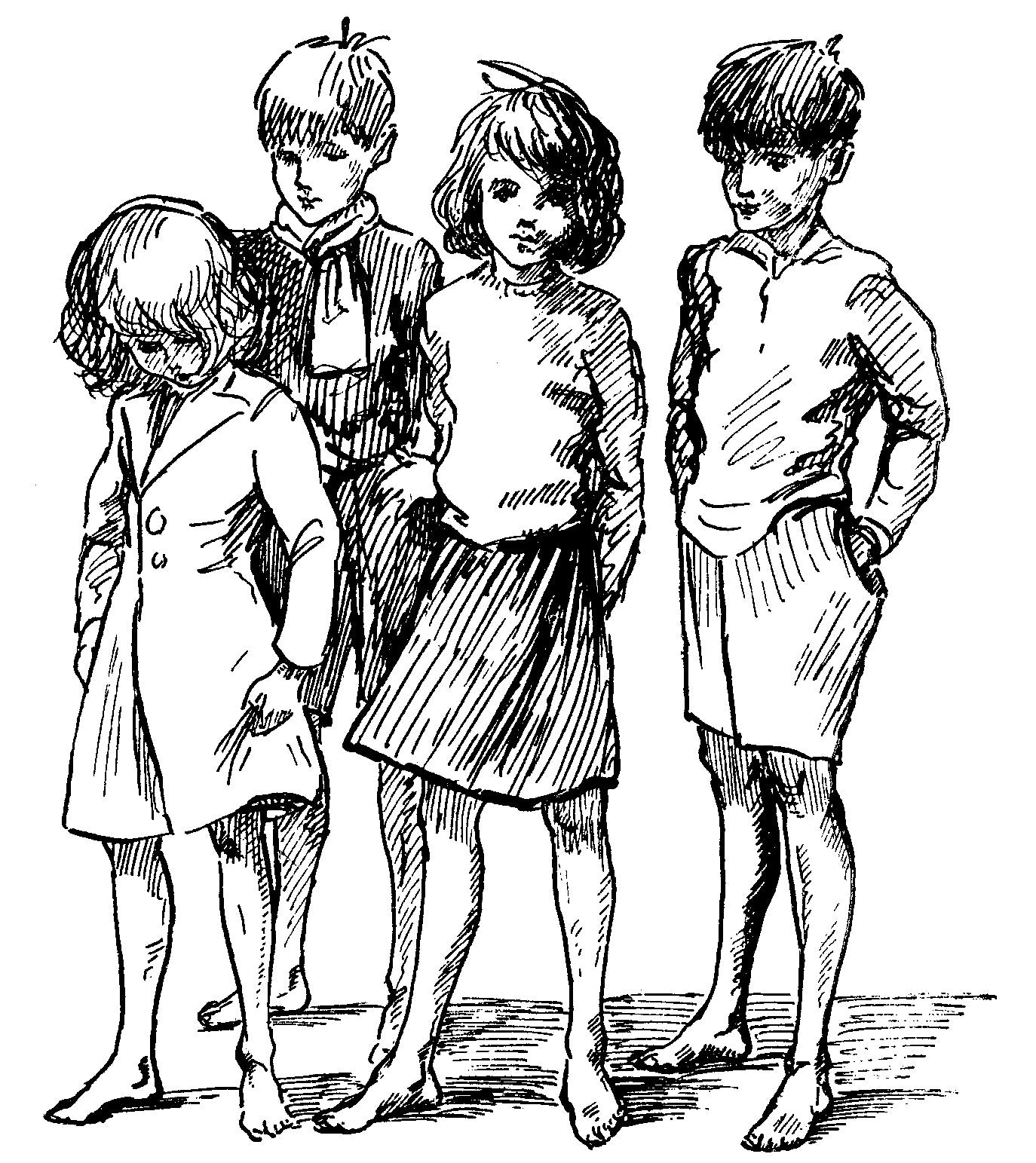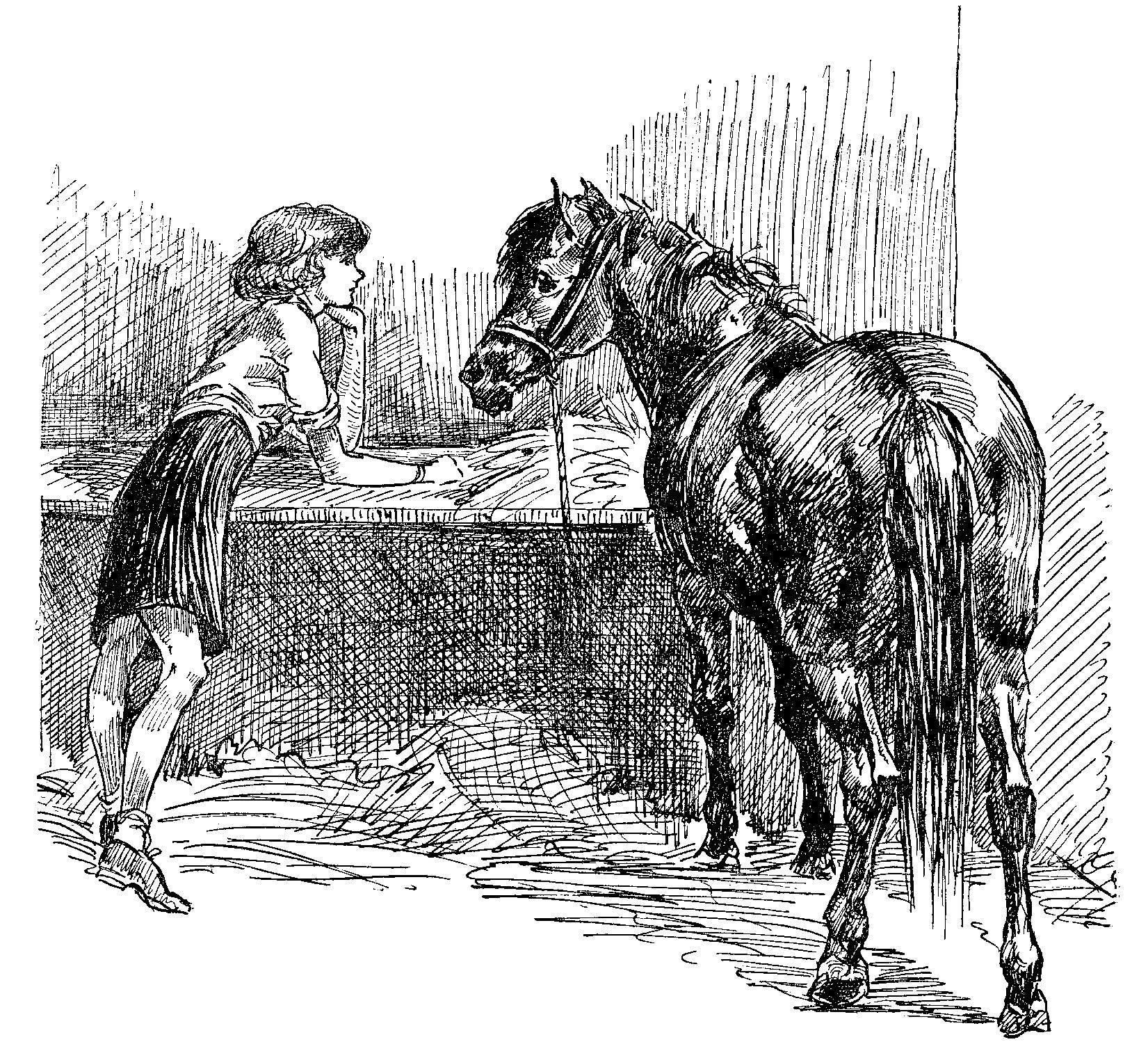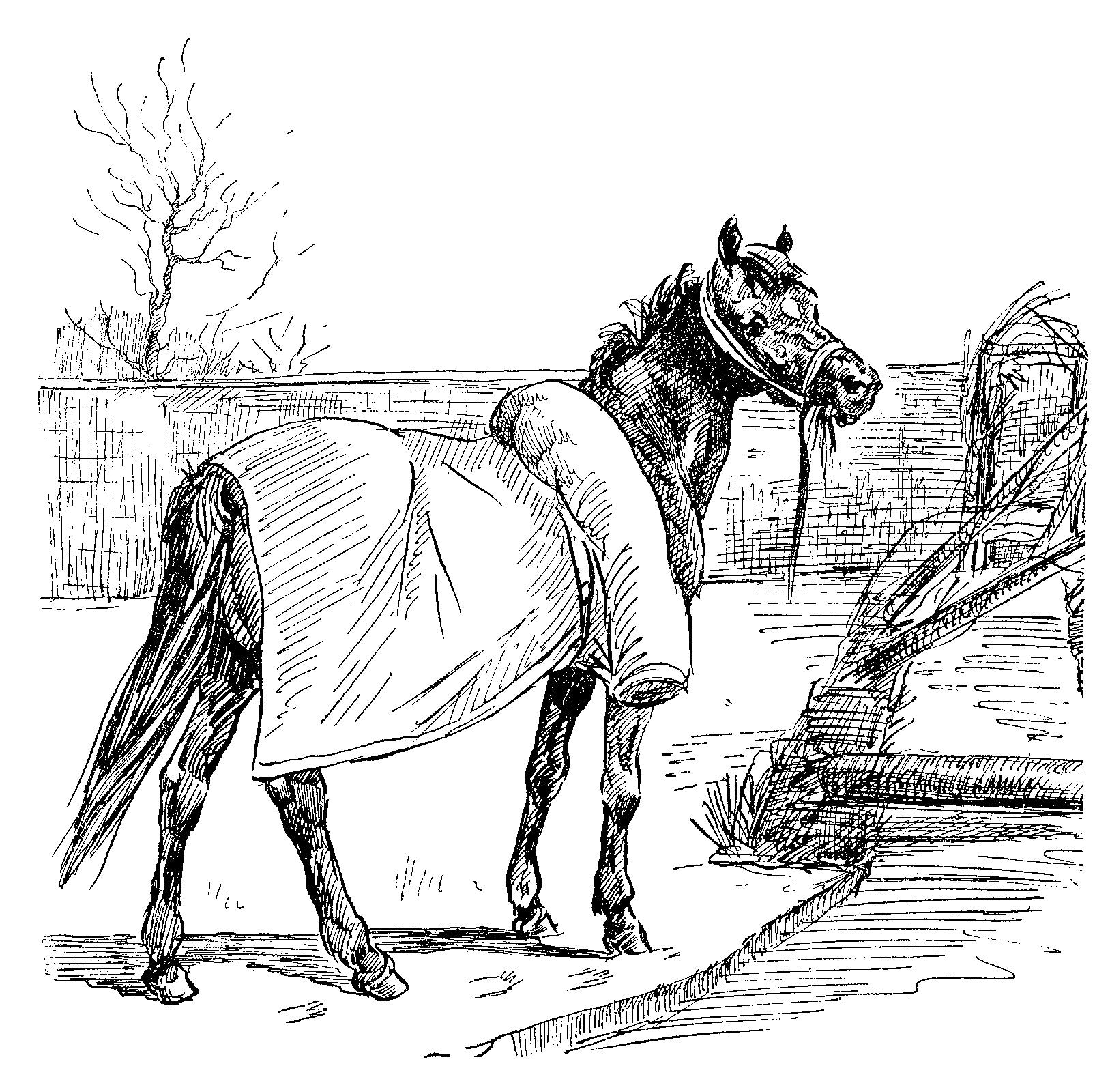Jane Badger Books
Joanna Cannan: London Pride (paperback)
Joanna Cannan: London Pride (paperback)
Illustrator: Anne Bullen
Couldn't load pickup availability
Share
John and Antonia return in this sequel to We Met Our Cousins, first published in 1939.
This time, the Scottish cousins are coming to London to spend Christmas. The wild cousins are certainly not what John and Antonia's friends and relations expect, particularly when they get up at dawn to fight a duel in the Square gardens and catch a burglar. Then they spot a pathetic pony pulling a rag-and-bone cart, and buy her.
The problem with living in smart central London is a lack of anywhere to keep a pony, but the children are undaunted. Can they keep her hidden in the summer house in the Square gardens without anyone spotting?
London Pride was published when hunting was still legal, and there is a hunting scene at the end of the book.
Cousins series 2
Page length: 150
Original publication date: 1939
When will I get my book?
When will I get my book?
Paperbacks are printed specially for you and sent out from our printer. They are on a 72-hour turnaround from order to being sent out. Actual delivery dates will vary depending on the shipping method you choose.
Read a sample
Read a sample
IF YOU have read the book which I wrote at the end of last summer holidays, you will know all about us and our cousins, but, in case you didn’t read it, I had better explain that we are John and Antonia Carey, and we live in London with our Uncle Gerald and our Aunt Pamela and their child, Robin, because our own mother and father are in India. In the summer holidays John and I were sent to stay with our cousins, Angus, Morag and Hamish, who live in an ancestral castle in the Highlands of Scotland; we didn’t want to go because we had been told that our cousins were wild and rough, and that Scotland was a dull and awful place where you ate porridge and it never stopped raining, but when we got to Roid we found that it was the most lovely and interesting place in the world, and, though we quarrelled with our cousins at first, we ended up by taking the Oath of Brothers in Blood with them.
On the fatal day when we had to leave Roid and say farewell, perhaps for ever, to the house and the ponies and the loch and the purple-headed mountains and our sensible cousins, the MacAlister, who is our cousins’ grandfather and Chief of the brave and noble Clan MacAlister, promised that Angus and Morag should come and spend the Christmas holidays with us in London. Angus and Morag said they didn’t want to; they said they would sooner run away to sea than spend a whole month in a horrible stuffy town with pavements, but the MacAlister said that they would do what they were told, and we knew that, even though it meant languishing in exile, no Highland gentleman would question the decision of his Chieftain. When I got back to London I made a calendar to cross off the days on; as I don’t like school much, I usually make calendars up to the end of term, but this one went on till the day when Angus and Morag were coming.
After Roid, it was awful being back in London. Aunt Pamela and Robin’s Nanny were annoyed because such a lot of our clothes had got lost or torn or had curled up owing to sea-water, and we couldn’t make them understand that you can’t stop to think about clothes when you are looking for caves containing the skeletons of your ancestors or riding maddened chargers in pursuit of desperate criminals. After all, the things we had done were quite sensible. We hadn’t found skeletons, but we had found interesting historical remains that museums liked, and I had got back Lady Creach’s jewels. I offered to spend the hundred pounds, which Lady Creach had given me as a reward, on new clothes for John and me, but Aunt Pamela wouldn’t let me. We spent hours and hours in stuffy shops trying on hot clothes, and the only good thing about it was that you could pretend to be an exiled Jacobite, dragging out a hopeless existence at the false and foreign court of Versailles, and languishing for a breath of the cool air of your native moorlands.
The other awful thing, that happened when we got back to London, was that we were suddenly told that John was going away to a boarding-school. Aunt Pamela said that it was a nice school on the South Coast, with modern ideas and a delightful head master, and Uncle Gerald said that John would enjoy mixing with the other boys and playing cricket and football. John said he wouldn’t. He said that the south was silly and that his heart was in the noble northland, and that it was pure spite to send him away just when we had got a ferret. In case you haven’t read my other book, I had better explain that Angus and Morag gave us a ferret as a parting present. They bought it with the money which the nobility and gentry paid for tickets for a play we acted at Roid, which was called A Traitor’s Doom, a tragedy in three acts, by the well-known author, Angus MacAlister. Our ferret was sweet and very affectionate except when he mistook our fingers for his dinner. His name was Claymore and we kept him in a hutch behind Robin’s Wendy House, on condition that he did not bite Robin or smell.
Well, a week passed and we did nothing but buy clothes, except for one afternoon when we found a hole, which we thought must be a rat’s hole, under Robin’s Wendy House. Of course we rushed and got Claymore out of his hutch and showed him the hole, and, though he was still very young, he seemed to know all about rats, and, after sniffing for a bit, he disappeared under the Wendy House. John and I took it in turns to lie down with our ears to the hole and listen for the sound of deadly combat, but ages passed and we couldn’t hear anything, and we began to have an awful feeling that Claymore had got stuck in the hole and was suffocating. We tried to move the Wendy House, but it was too heavy, and then we went inside, where we are not allowed to go because Robin is so beastly about other people using his things, to see if we could take up the floorboards, but they were screwed down and the screws had rusted in, and the screwdriver in John’s best knife wouldn’t move them. We wasted ages over the screws and then we went out and tried to lift the house again. We were feeling awful, and this time despair gave us strength and we did lift it, but with fatal results—we had just got it off the ground when John’s arms gave way and the idiotic Wendy House overbalanced and, with a crashing of glass and a splintering of timber, fell forward on its front and lay in ruins on the top of the little pond where Robin keeps his dull and dismal goldfish.
When the sound of the crash had died away, John said, “Gosh!”
I said, “Boys are feeble.”
John said, “It wasn’t me who let go of the beastly thing. You did.”
I said, “I didn’t. YOU did,” and John said, “Oh, you awful …” and then stopped as the door that leads from the hall into the garden opened, and Aunt Pamela rushed out, followed by Robin.
“Oh!” shrieked Aunt Pamela, “the Wendy House! The dear little Wendy House! Robin’s Wendy House! Which of you two upset it?”
John and I both said, “We both did.”
“How can you be so naughty?” said Aunt Pamela.
I tried to explain that we hadn’t been naughty, but when Aunt Pamela heard that we had been looking for Claymore she was more annoyed than ever. Robin was shrieking his head off and I must say I did feel rather sorry for him, though he has always been mean about his Wendy House; he never plays with it himself—his favourite toy is soulless trains—but he won’t let us play with it, not that we want to play with anything so babyish as a Wendy House, only it would come in useful for the log cabin in Treasure Island or Cluny’s cave. I told Robin that I would buy him a new Wendy House out of the hundred pounds that Lady Creach gave me, but Aunt Pamela said that she was tired of hearing about my hundred pounds and that it had made me very conceited. We had learned from Angus that in these degenerate days when you are not allowed to fight duels, the best way to treat a deadly insult is with dignified silence, so I was dignifiedly silent until Aunt Pamela said that John and I were to go to bed for the rest of the day. Then I simply shrieked, “We can’t. We must find Claymore.”
Aunt Pamela said that we must leave Claymore, but John explained that he had gone down the rat’s hole and it probably went under the wall and came up in the next-door garden, and that if the next-door people tried to catch Claymore he would bite them and they would get blood-poisoning and Aunt Pamela would be responsible because we are too young to be fined or put in prison or hanged or anything. Aunt Pamela said that she had said from the beginning that Claymore wasn’t a suitable pet; we had better hurry up and find him, she said, and she didn’t know what Uncle Gerald would say, and it was a good thing that John was going to school to mix with other boys. Then, after one more look at the ruins of the Wendy House, she and Robin went in because of the damp.
Who's in the book?
Who's in the book?
Human: Antonia, John, Morag, Angus, Robin, Aunt Pamela, Uncle Gerald, Nanny, Lord Peveril
Equine: London Pride, Daydream
Other titles published as:
Other titles published as:
Series order
Series order
1. We Met Our Cousins
2. London Pride
